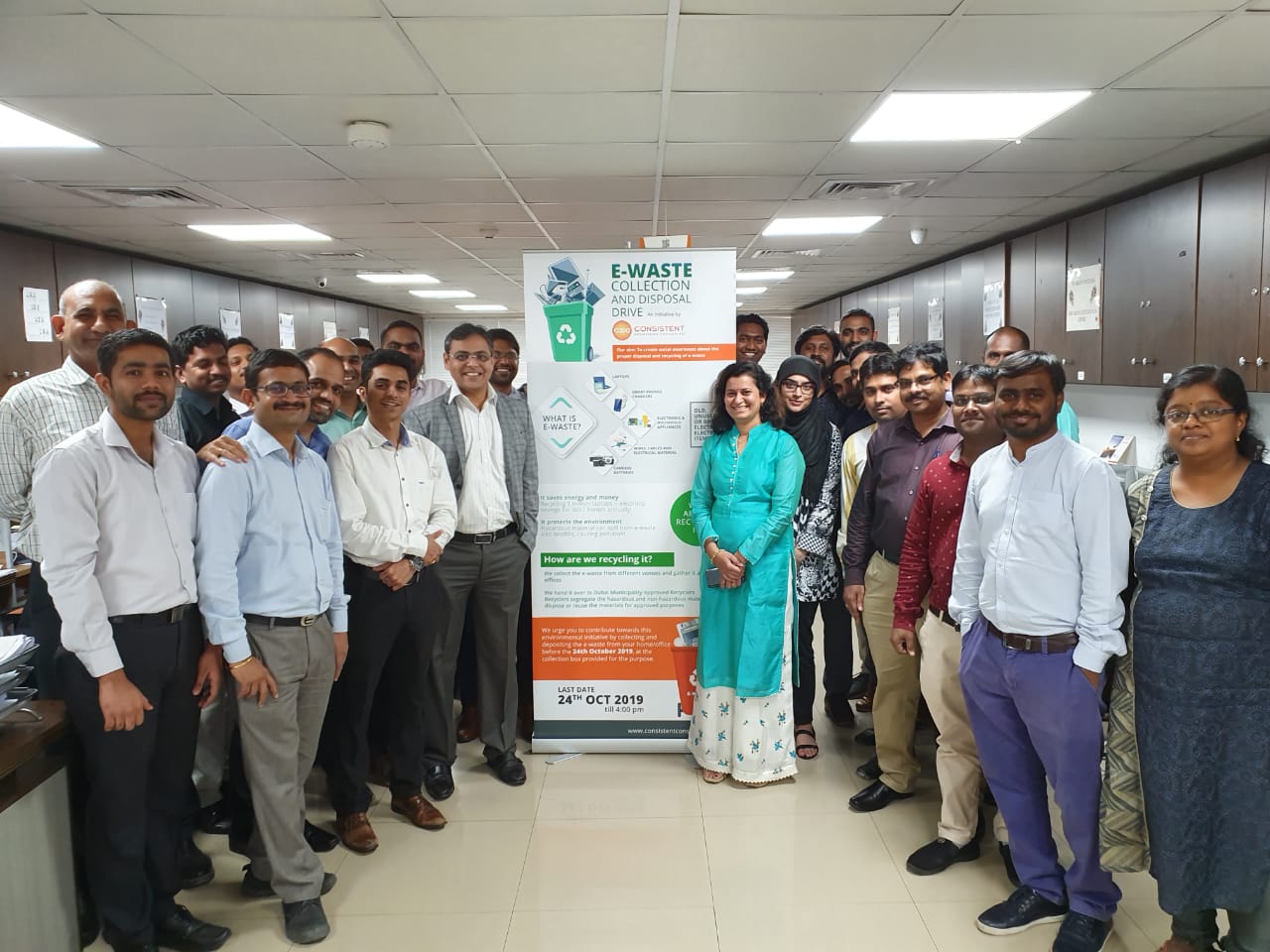An Overview of the E-Waste Problem; and a Recycling Drive in Dubai
Green

January 12, 2020, 6:28 am
“The world is changed by your example, not by your opinion.”
– Paulo Coelho, author
It is a simple, inescapable truth: our actions define us, far more so than our words. Today as we grapple with global problems like pollution and climate change, it is important to do our small part for the same. Acknowledging this, Consistent Engineering Consultants, an MEP and Sustainable Building Consultancy in Dubai, UAE recently carried out an e-waste collection drive throughout its offices and site locations in partnership with authorized recyclers. The campaign was a success and created awareness about the rising menace of electronic or e-waste.
What is E-Waste?
Electronic waste or e-waste can be defined as discarded electrical or electronic devices, as well as used electronics that are destined for refurbishment, reuse, resale, salvage recycling through material recovery, or disposal. As incomes in developing countries rise steadily, so does the buying power of their residents. And as companies come out with ever-newer versions of their products- smartphones, laptops, and LED screens- people get into the habit of upgrading their devices every 2-3 years! This has led to a very pressing concern about the proliferation of electronic waste, and the need for its proper disposal.
Why Should it be Recycled?
The major reason why e-waste needs to be properly disposed of is that it usually contains high amounts of toxic materials such as arsenic, mercury or cadmium. When such waste material is disposed of in landfills, these materials seep into the soil and even the groundwater, causing soil and water pollution. Such harmful materials can thus, end up as a hazard to human health.
Additionally, e-waste also contains some quantities of rare metals such as gold, silver, platinum, etc. So when such e-waste enters a landfill, these metals are buried and lost, while if recycled, they can be recovered and reused. Thus, proper recycling and disposal of e-waste help conserve the rapidly depleting natural resources!
A Look at the Statistics
If we take a look at the statistics, though, it becomes clear why this has become such a crucial issue. According to UN research, the world produced approximately 50 million tonnes of e-waste in 2018! Unfortunately, only about 20% of it found its way to being properly recycled and disposed of. The rest of it- 40 million tonnes– went into landfills or was disposed of in informal and unregulated ways.
This problem is especially exacerbated in countries with a very high per capita income, such as the UAE. On average, a UAE resident generates 17.2 kg of e-waste per annum. According to the Global E-Waste Monitor Report, in the year 2016, the total e-waste generated by the UAE was 134,000 tonnes, a figure that has only increased in the years after. Along with Saudi Arabia and Kuwait, UAE is one of the biggest generators of e-waste in the region. Even though the UAE government has recognized this and started taking action to counter this threat, a large part of the population is yet to be made aware of this reality.
Measures Taken in the UAE
To combat the threat of e-waste the UAE Government has established the Integrated Waste Management system, designed to meet the ambitious goal of diverting 75% of the total municipal solid waste (which includes e-waste) away from landfills by 2021 as per National Agenda of the UAE Vision 2021. The Municipalities of the seven Emirates including Abu Dhabi and Dubai, are also supporting private organizations that are promoting and managing proper e-waste recycling.
For example, in Dubai, the world’s largest recycling plant has been built in Dubai Industrial City, in partnership with Enviroserve, a global recycling company. The plant has a capacity of processing 39,000 tonnes of e-waste per year. Similarly, an upcoming facility in Sharjah, which will convert waste to energy and recycle e-waste, is expected to divert almost 300,000 tonnes of solid waste every from the landfills.
As evinced by these statistics, the proper management and recycling of e-waste is one of the major challenges we face for a sustainable future. There are a number of factors contributing to the rise of e-waste that needs to be addressed, such as:
– The rise of disposable incomes in developing economies
– The dearth of organized e-waste management techniques
– The absence/inadequacy of local and national policies regarding e-waste disposal
– The lack of awareness regarding the importance of e-waste management
With its campaign of E-Waste Collection and Recycling, Consistent Engineering Consultants is working to create awareness within the construction sector, as well as amongst the general public. During the lead up to the Diwali festival, E-Waste Collection Boxes were placed at their offices and site locations across Dubai. It also received an enthusiastic response from some of the noteworthy architectural and engineering firms, as well as from the residents of Dubai. The collected e-waste, amounting to more than half a tonne was handed over to E-Scrappy Recyclers, a Dubai Municipality-approved recycling agency.
A number of such campaigns being initiated are bringing awareness to the general public regarding e-waste recycling. It is to be hoped that the world can tackle the e-waste problem successfully in the decades to come, and embrace a sustainable future.
Sources:
The Global E-Waste Monitor Report 2017
https://www.thenational.ae/uae/electronic-waste-a-pressing-issue-in-the-uae-1.97861
UAE – A Key Contributor In Driving Effective E-waste Management
https://gulfnews.com/uae/environment/new-uae-federal-law-aims-at-75-of-waste-
recycling-1.2218395
https://www.wamda.com/2018/10/middle-east-e-waste-problem










